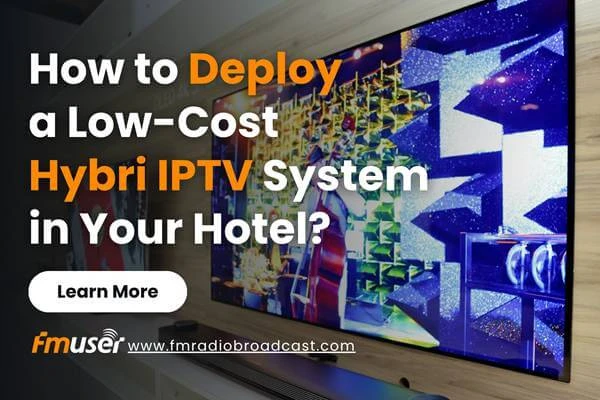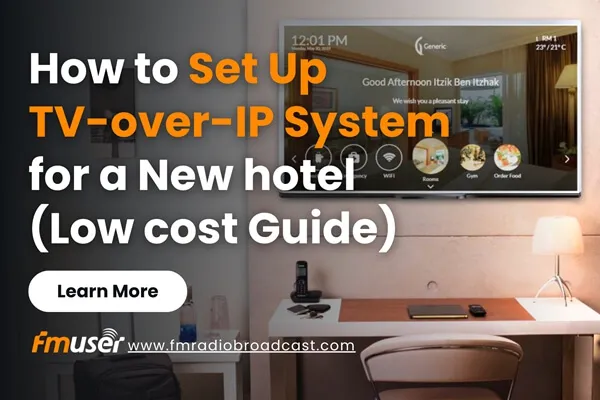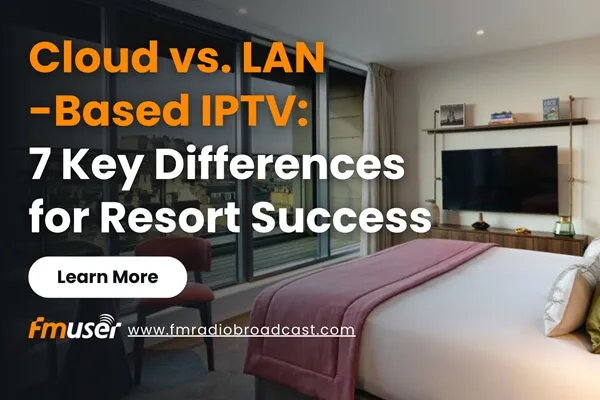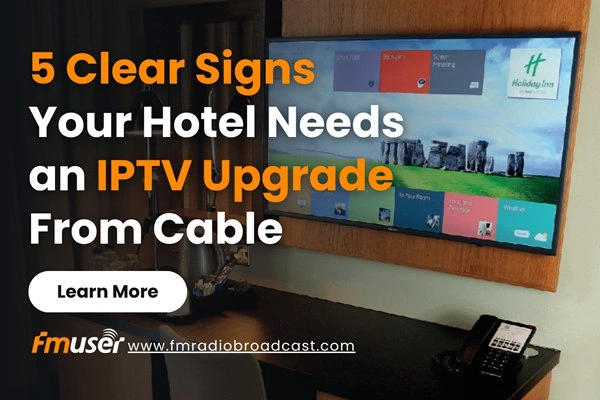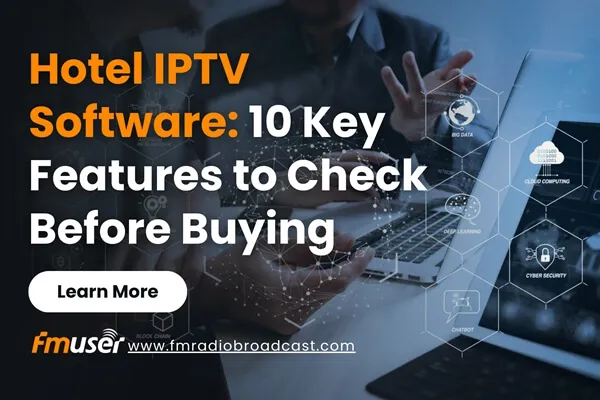
Hot tag
Popular search
10 Proven Ways IPTV Transforms Hotel Video Distribution | FMUSER Guide
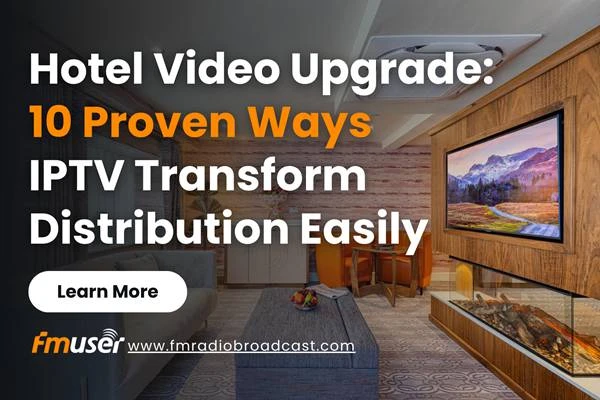
1. Introduction: The Costly Reality of Traditional Cable TV for Hotels
For decades, hotels have relied on cable TV systems to deliver entertainment to guests. But behind the familiar channel grids lies a reality hoteliers know too well: escalating costs, frustrating limitations, and missed revenue opportunities. Imagine paying $15–$30 monthly for every room just to offer basic DSTV or Canal+ packages, only to face endless guest complaints about buffering screens, outdated content, or the inability to watch local UHF channels.
👇👇 New Arrival! 👇👇
FMUSER FBE013 Magic IPTV STB Kit with RC
|
FMUSER FBE013 IPTV Smart Hotel Magic Box Kit with RC! Click here for details.
|
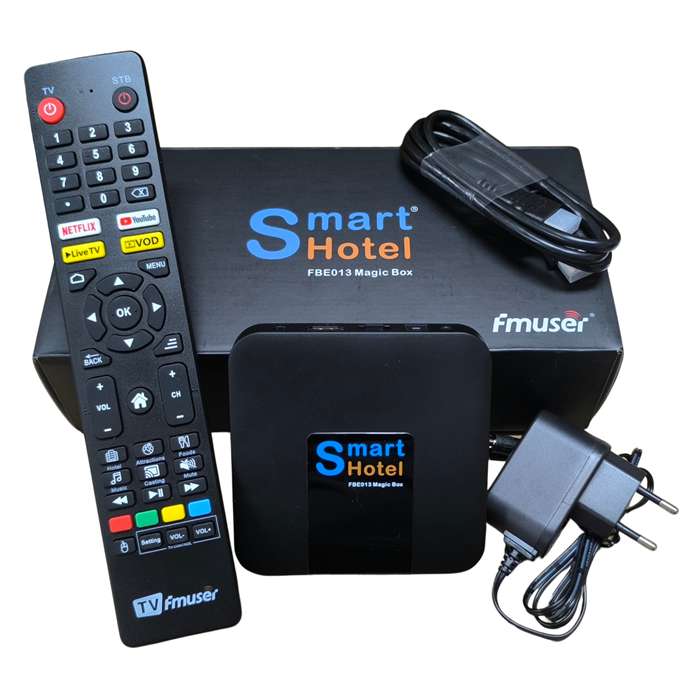 |
This isn’t just an annoyance—it’s a drain on budgets and guest satisfaction scores, especially for hotels in Africa where fluctuating subscription fees and rigid infrastructure amplify the pain.

Traditional cable TV shackles hotels to a "one-box-per-room" model, forcing them to buy costly subscriptions for each unit. A 50-room hotel, for example, might spend over $9,000 annually on DSTV alone, with zero flexibility to add local broadcasts or promotional content. Even worse, guests increasingly expect modern features like Video on Demand (VOD) or seamless streaming—functionality cable TV simply can’t deliver due to its reliance on outdated coaxial cables and proprietary hardware.
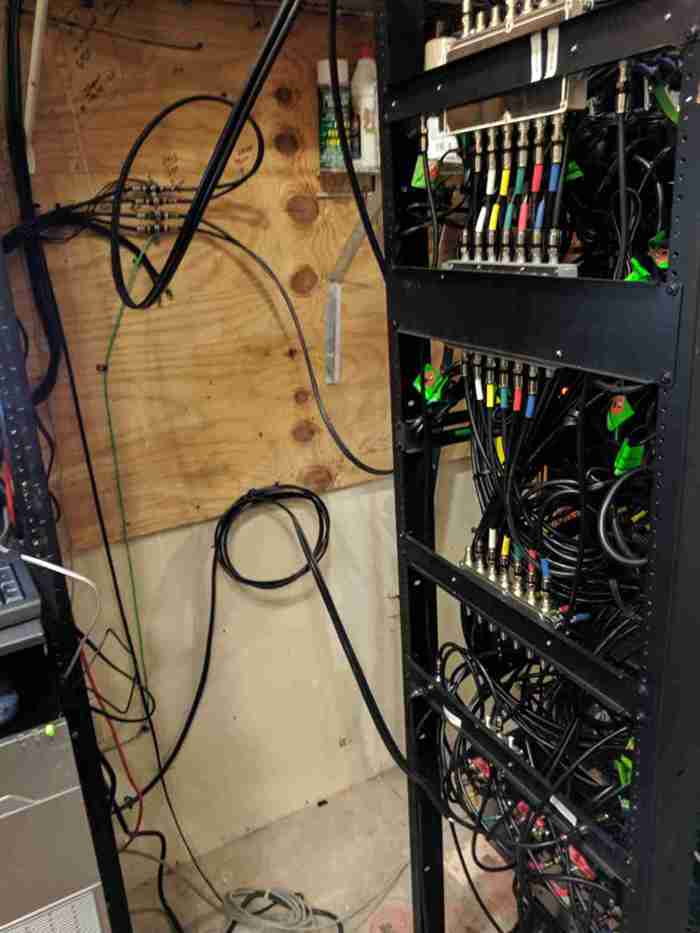 |
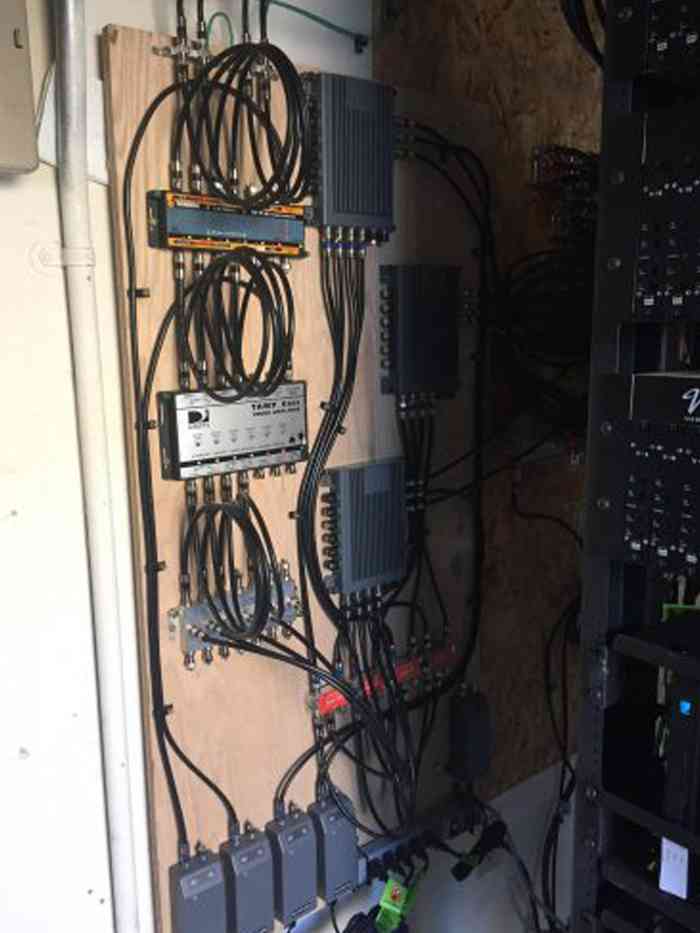 |
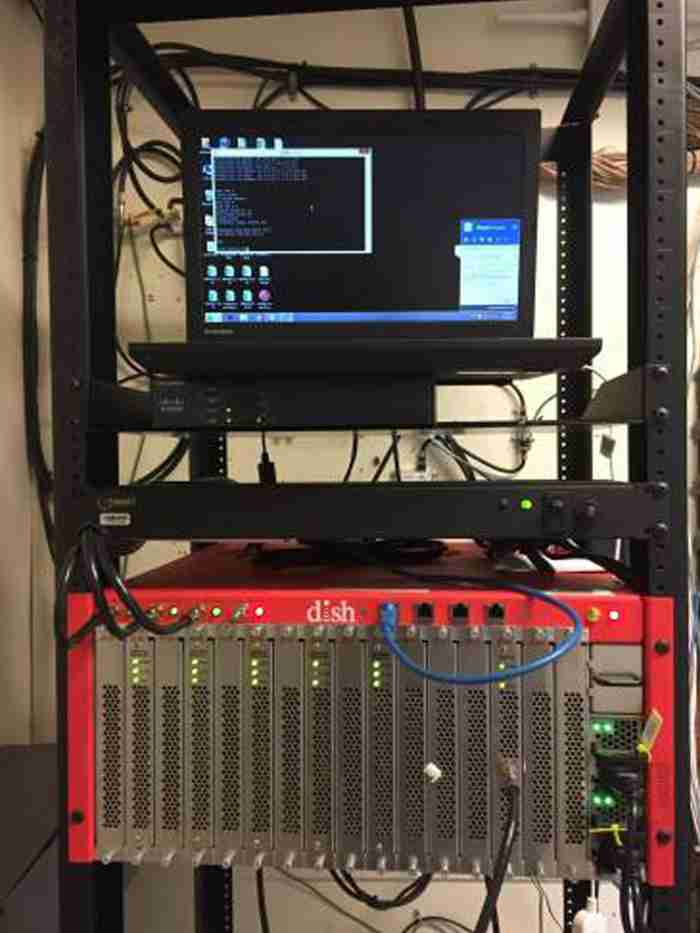 |
This is where Hotel Video Distribution enters a new era. LAN-based IPTV systems are quietly replacing cable TV, empowering hotels to slash subscription fees by up to 80% while offering guests crisper content and richer customization.
Unlike cable, IPTV leverages your existing LAN infrastructure to centralize streaming. A single DSTV box paired with an HDMI encoder can feed live TV to hundreds of rooms, eliminating redundant subscriptions. Local UHF channels, USB-driven promos, or even in-house ads can run alongside premium content—all controlled from one intuitive dashboard.
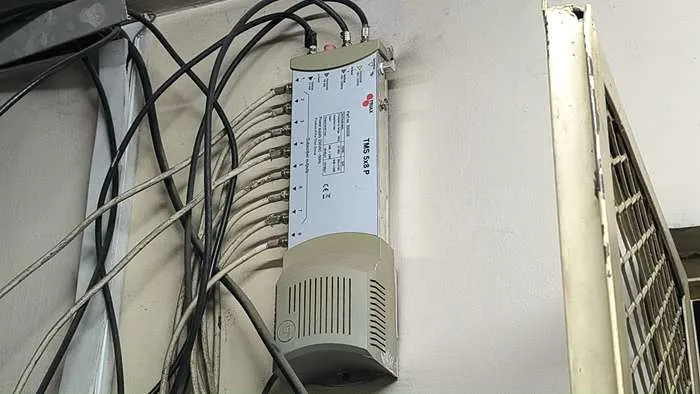 |
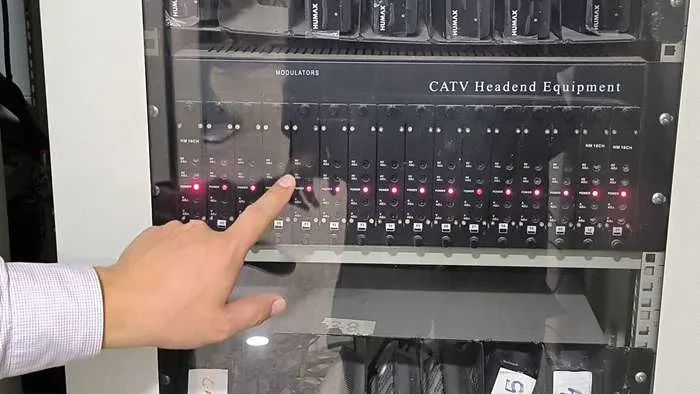 |
The shift isn’t just about saving money. It’s about transforming TVs from basic amenities into tools that boost guest loyalty and revenue. African hoteliers, in particular, are embracing IPTV’s ownership model, which cuts long-term dependency on cable providers and cloud-based middlemen. Why pay recurring fees for inflexible tech when you own a system tailored to your hotel’s needs?
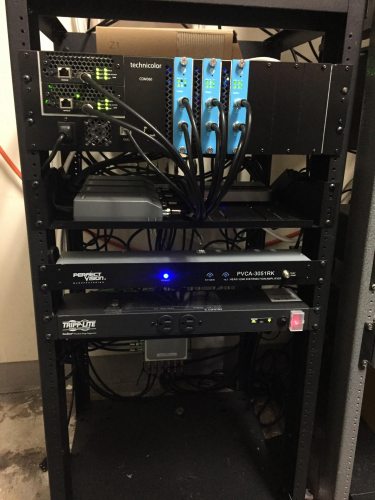 |
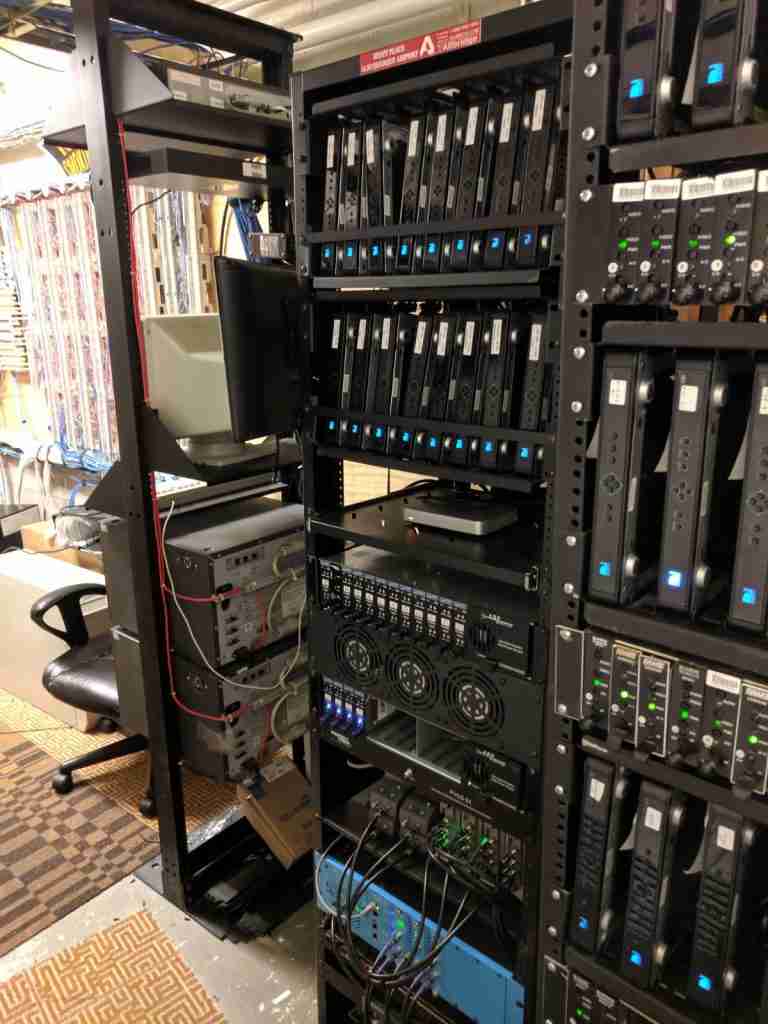 |
In the sections below, we’ll explore how IPTV solves cable TV’s biggest frustrations while unlocking new value—no rewiring or technical expertise required.
Contact Now, We're Here to Help!
2. Slash Subscription Fees: One DSTV/Canal+ Box for 100+ Rooms
Picture this: Your 100-room hotel pays $30 monthly for each DSTV subscription—a staggering $3,000 per month just to offer guests the same channels they could watch at home. Multiply that over a year, and you’re hemorrhaging $36,000 annually on repetitive subscriptions. This "one-box-per-room" model isn’t just expensive—it’s unnecessarily wasteful, especially when IPTV offers a smarter way to manage Hotel Video Distribution.
With a LAN-based IPTV system, hotels can break free from this cycle. Here’s how:
- Centralize, Don’t Multiply: Instead of installing a DSTV/Canal+ box in every room, IPTV uses a single decoder paired with an HDMI encoder (like FMUSER’s HE500 series). This setup digitizes the signal and streams it over your hotel’s existing local network to all TVs simultaneously, whether you have 50 rooms or 500.
- Cut Subscription Costs by 80%+: Let’s do the math. If your hotel needs 5 premium DSTV channels, you’d use just 5 encoders (not 100 boxes). At $30 per subscription, your monthly bill drops from $3,000 to $150—pocketing $2,850 in savings every month. For African hotels, where budgets are tight and currencies fluctuate, this shift alone pays for the IPTV system within a year.
Why This Matters for African Hospitality
- Shield Against Currency Volatility: Many cable providers charge in USD or EUR. IPTV’s one-time hardware costs (encoders, servers) let you lock expenses in your local currency, avoiding exchange rate shocks.
- Scalability Without Surprises: Adding rooms? IPTV grows with you—no need to beg providers for extra “per-room” approvals or fees. Just plug in another HDMI encoder.
The Hidden Win: Unlock Local Content for Free
While cable TV traps you in rigid bundles, IPTV lets you mix paid channels with free local UHF broadcasts or USB-loaded hotel promos. Imagine airing Nairobi’s top sports events or cultural programs alongside Canal+—all without paying a dime extra. This isn’t just cost-cutting; it’s smart content curation to delight guests.

For hotels in Lagos, Accra, or Cape Town, IPTV turns video distribution from a money pit into a strategic asset. Why bleed cash on redundant subscriptions when a centralized system can do more for less?
Contact Now, We're Here to Help!
3. Ditch Buffering Forever: LAN-Based Streaming for Crisp Quality
Imagine a guest settling into their room, eager to watch the AFCON finals or a buzzed-about Netflix series—only to face endless buffering, pixelated screens, or audio that drops mid-sentence. These aren’t just minor inconveniences; they’re reputation killers for hotels still relying on outdated cable TV systems.
| Cable TV System | FMUSER IPTV System |
|---|---|
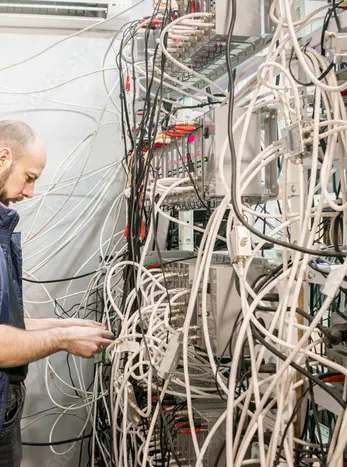 |
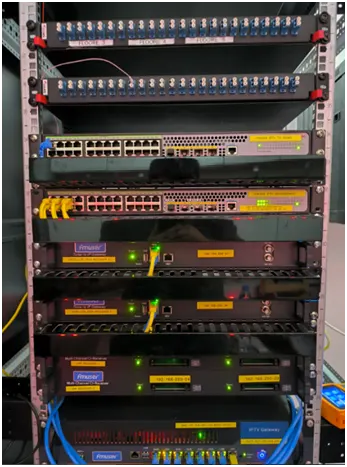 |
Traditional cable TV depends on coaxial cables, a decades-old technology with the bandwidth of a single-lane road. When multiple guests tune in simultaneously (say, during primetime sports or news hours), the system clogs, forcing everyone to endure choppy streams. It’s like trying to pour a gallon of water through a straw—there’s just no room for modern, high-definition content.
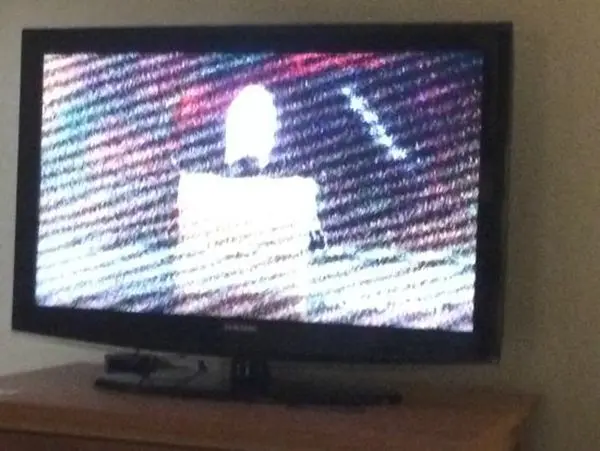
LAN-based IPTV changes the game by leveraging your hotel’s existing internet infrastructure. Think of it as upgrading from dial-up to fiber optic:
- Smooth, Uninterrupted Playback: IPTV uses your local network (LAN/Wi-Fi) to distribute video, which operates like a multi-lane highway. Each TV gets its own "lane," so live sports in Room 101 won’t slow down a movie streaming in Room 205.
- Future-Ready Resolution: Unlike cable’s compressed signals, IPTV supports HD and 4K content natively, ensuring crisp visuals that match what guests enjoy at home.
Why This Matters for Guest Satisfaction
- No More Buffering Complaints: LAN-based streaming eliminates the “traffic jams” of coaxial cables. Whether guests are watching local news or international sports, playback stays smooth—even during peak hours.
- Quality That Matches Modern Expectations: Today’s travelers expect Netflix-level streaming. IPTV delivers exactly that, while cable TV struggles to keep up with outdated hardware.
A Hidden Advantage: Control Over Stability
With cable TV, your stream quality depends on external provider networks. Rainstorms, technical glitches, or overloaded regional servers can ruin the experience. IPTV’s self-contained LAN system keeps video distribution in-house, meaning reliability stays in your hands. For hotels in regions with inconsistent internet infrastructure (like remote African resorts), this localized approach ensures guests always get a premium viewing experience.
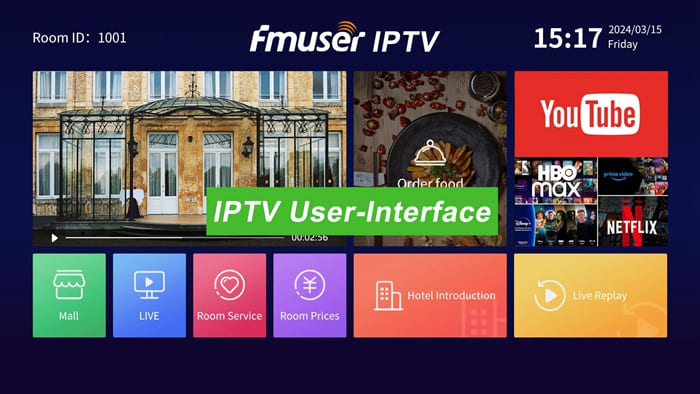
Buffering isn’t just annoying—it’s a direct hit to your guest satisfaction scores. IPTV’s LAN-based streaming turns TVs into assets that keep visitors happy (and leaving 5-star reviews), not frustrated.
Contact Now, We're Here to Help!
4. Mix, Match, Monetize: Your Hotel’s TV Channels, Your Rules
Picture a guest flipping through your hotel’s TV menu. Instead of the same stale DSTV lineup, they discover live Serie A matches and Nairobi’s hottest UHF music channel, a promo for your rooftop bar, and a sponsored ad from a local safari tour company—all seamlessly woven into one tailored entertainment experience. This is the power of IPTV-driven Hotel Video Distribution, where you’re no longer shackled to rigid cable bundles.
Break Free from the Cable Straitjacket
Traditional cable TV forces hotels into a “take it or leave it” model. Want to add a local UHF channel via a $50 USB antenna? Or stream USB-recorded wedding event videos to specific rooms? Cable providers simply say no. IPTV flips this script:

- Blend Paid & Free Content: Pair 3–4 premium DSTV/Canal+ decoders with free-to-air UHF broadcasts, USB-loaded hotel promos, or live feeds from lobby cameras.
- Hyper-Local Flair: Add regional channels (e.g., Ghana’s TV3 or Kenya’s Citizen TV) via cheap HDMI encoders—no subscriptions required.
- Dynamic In-House Ads: Schedule promo loops for your spa, restaurant, or events between live TV segments.
Turn TVs into Profit Centers
Why stop at cutting costs? IPTV lets you generate revenue:
- Forced Ad Interruptions: Partner with local businesses to run 15-second ads during live TV (e.g., “Enjoy 10% off at XYZ Restaurant—2km from this hotel!”).
- VOD Libraries: Charge guests $2–$5 to rent the latest movies or kids’ shows via your in-house video library.
- Sponsored Channels: Let nearby tour operators “rent” a channel slot to showcase their safari packages.
Example: A 100-room Lagos hotel using forced ads and VOD could earn $1,200+ monthly—offsetting IPTV costs while enhancing guest options.
“No more begging cable providers for flexibility.”
Unlike cable’s one-size-fits-all approach, IPTV hands you the remote control. African hoteliers use this to:
- Celebrate cultural events (e.g., stream local festivals to all rooms).
- Upsell services (e.g., display breakfast menus during morning news).
- Foster community ties (e.g., air free local church services on Sundays).
Ownership Over Outsourcing
Cloud-based IPTV may tempt with lower upfront costs, but it often locks hotels into subscription traps—paying extra for ad integrations or VOD setups. LAN-based systems (like FMUSER’s solutions) let you own the hardware outright, avoiding third-party fees. For hotels in regions with spotty internet, this ensures ads, promos, and UHF content work flawlessly offline.
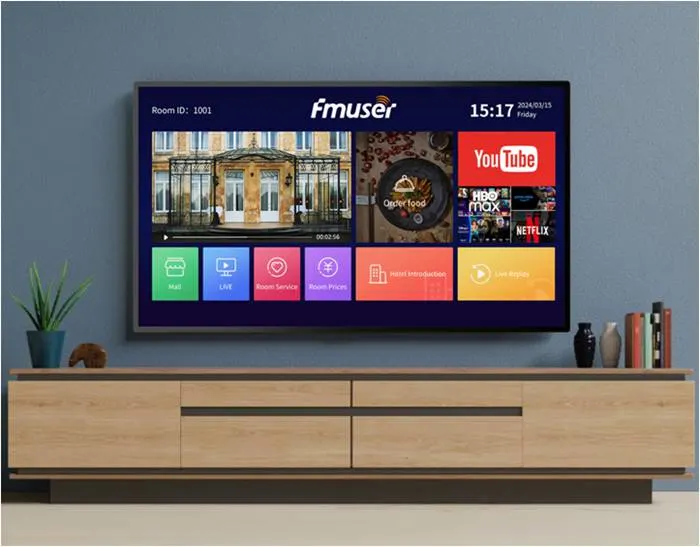
IPTV doesn’t just replace cable—it transforms your TVs into versatile tools for branding, revenue, and guest loyalty. How much could your hotel earn with 100% control over its video distribution?
Contact Now, We're Here to Help!
5. Future-Proof Your Infrastructure: Scalability Without Rewiring
Imagine this: Your hotel expands to 200 rooms, but adding cable TV to the new wing means weeks of rewiring, negotiating with providers for extra decoders, and sky-high installation fees.
Worse, outdated coaxial cables limit your ability to integrate modern features like casting or 4K streaming. Traditional cable TV locks hotels into a rigid, static system—until now.

LAN-based IPTV turns “scalability” from a headache into a plug-and-play solution. Here’s how:
- Grow on Your Terms: With IPTV, adding channels or rooms is as simple as plugging in an HDMI encoder. Need 2 more DSTV feeds? Connect 2 encoders. Expanding to 300 rooms? IPTV scales using your existing LAN cables and switches—no rewiring.
- Rip Out Nothing, Upgrade Everything: Renovating an older hotel? Keep the existing network infrastructure. IPTV works alongside it, future-proofing your investment without demolition crews or downtime.
Ownership Over Cloud Traps
While cloud-based IPTV vendors dangle “low upfront costs,” they bury hotels in monthly fees for basic features like ad management or guest casting. FMUSER’s LAN-based model flips this:
- No Hidden Fees: Buy the hardware once, own it forever. No annual licenses, no per-room charges, no third-party meddling.
- Offline Reliability: Africa’s internet isn’t always reliable. LAN-based systems keep all content (live TV, ads, VOD) running smoothly, even during outages.
Built for Africa’s Growth
For new hotels, IPTV is a no-brainer:
- Pre-Wired for Tomorrow: Design your TV system once. Whether you’re opening 50 rooms today or 200 in 5 years, the same LAN backbone supports seamless expansion.
- Local Control, Global Standards: Mix DSTV with UHF channels, add USB promos for local events, or integrate casting—all managed from an African-friendly interface.
Cable TV ties hotels to yesterday’s tech. IPTV lets you own a system that evolves with your needs, budget, and ambitions—no permission slips or surprise bills required.
Contact Now, We're Here to Help!
6. Guest Experience Upgrades: Welcome Messages, Casting & More
Imagine a guest unlocking their room after a long safari tour. As they turn on the TV, a personalized welcome screen pops up: “Welcome back, Ms. Adebayo! Tonight’s dinner special: Jollof rice served poolside at 7 PM.” Below, a short promo plays showcasing your spa’s relaxing massage packages. This isn’t a luxury reserved for five-star resorts—it’s what IPTV makes possible for every hotel through smarter Hotel Video Distribution.
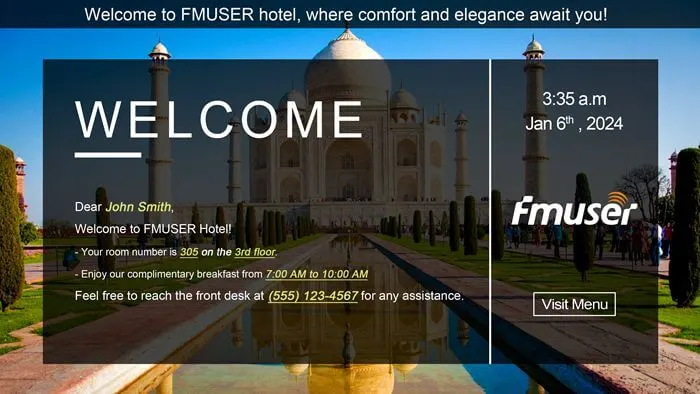
Branded Touchpoints that Delight
- Tailored Welcome Screens: Greet guests by name (pulled from your PMS) with check-in times, weather updates, or event highlights. A family checking into a Lagos hotel could see: “Welcome, Adeyemi Family! Don’t miss Saturday’s Kid’s Craft Hour at 10 AM.”
- Custom TV Menus: Replace generic channel grids with curated categories like “Local Attractions,” “Hotel Services,” or “Nollywood Favorites.” A Cape Town boutique hotel could bundle AFCON matches with wine-tasting tour ads.
- Seamless Phone-to-TV Casting: Let guests stream Netflix, YouTube, or vacation photos directly from their phones to the TV—no clunky HDMI cables. Perfect for business travelers needing to prep presentations or families sharing holiday snaps.
.
Scenario: A couple celebrating an anniversary at your Nairobi lodge turns on the TV to find a “Happy Anniversary!” message followed by a video montage of nearby Maasai Mara sunset tours. Later, they cast their wedding video to relive memories in HD—all while your spa promo loops subtly in the background.
Why This Earns 5-Star Reviews
Guests don’t just remember comfy beds; they rave about experiences. IPTV’s interactive features:
- Boost Perceived Value: Branded interfaces signal modernity, making guests feel they’ve chosen a tech-savvy hotel.
- Drive Ancillary Sales: A well-timed spa ad during checkout hours can increase bookings by 20% (based on hotel case studies).
- Encourage Social Sharing: Unique features like casting or personalized messages inspire Instagram posts and TripAdvisor shoutouts.
Africa’s Competitive Edge
While international chains rely on cookie-cutter cable systems, African hotels can leverage IPTV to spotlight local culture—think UHF broadcasts of Accra’s Chale Wote festival or sponsored safaris via in-house ads. These hyper-local touches differentiate your property while deepening community ties.

In an era where travelers crave personalization, IPTV turns TVs into silent concierges—working 24/7 to impress guests, upsell services, and cement loyalty.
Contact Now, We're Here to Help!
7. Africa’s Hidden Advantage: Ownership Beats Cloud Reliance
Cloud-based IPTV solutions might seem tempting at first glance—lower upfront costs, "easy setup," and promises of hands-off management. But for African hoteliers, these models often hide a costly truth: you don’t own your system. Instead, you rent it indefinitely, trapped in a cycle of monthly fees, restrictive contracts, and limited control.
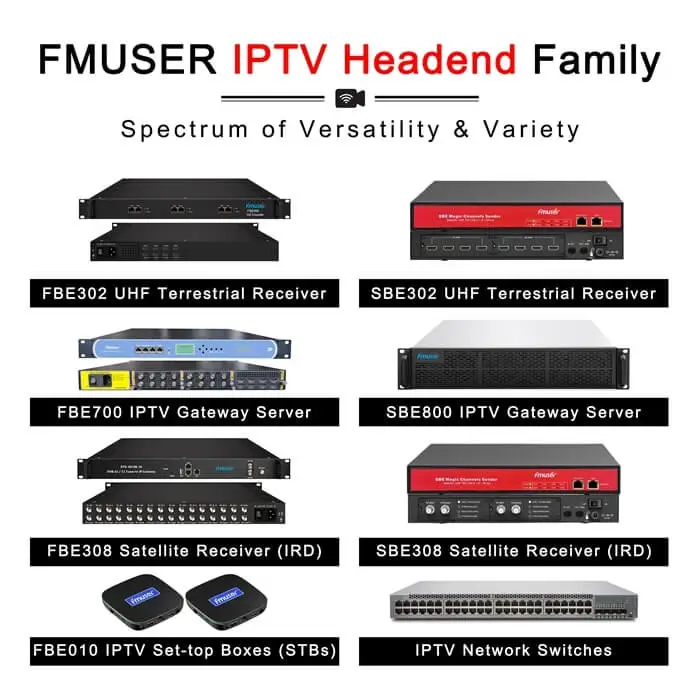
LAN-based IPTV flips this dynamic, giving hotels full ownership of their tech—a game-changer for long-term ROI and autonomy.
Why African Hoteliers Prefer ‘Owning’ Their Tech
- Escape Subscription Traps: Cloud providers charge $200–$500/month for basic features like VOD or ads—costs that balloon as you add rooms or services. With LAN-based IPTV (like FMUSER’s solutions), you buy the hardware once. No recurring fees, ever.
- Dodge Currency Chaos: Many cloud vendors bill in USD/EUR. For hotels in Nigeria, Ghana, or Kenya, currency swings can turn a "budget-friendly" $300/month plan into a $600/month nightmare. Owning LAN hardware locks costs in your local currency.
- Work Offline, Always: Internet outages? No problem. LAN-based systems store ads, UHF channels, and VOD libraries locally, ensuring seamless operation even during blackouts—a lifeline for remote lodges or city hotels with shaky ISP reliability.
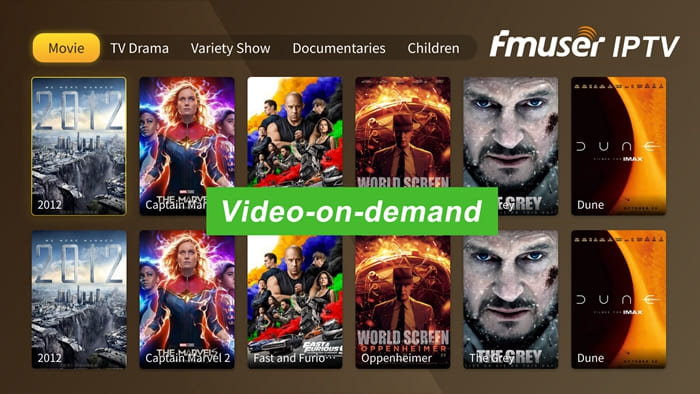
Example: A 100-room Kampala hotel using cloud IPTV might pay $350/month ($4,200/year). Over 5 years, that’s $21,000—enough to fully own a robust LAN system and save $6,000+ for upgrades.
The Cloud’s Hidden Costs
- Customization Fees: Want to add a USB promo channel or tweak ad schedules? Cloud providers often charge $50–$150 per "change request." With LAN-based ownership, you make updates instantly—for free.
- Third-Party Control: Cloud systems can sunset features, hike prices, or even shut down (leaving you stranded). Ownership means your rules, your timeline.
Future-Proofing African Hospitality
Africa’s hotel industry is booming, but growth demands flexibility. LAN-based IPTV lets you:
- Repurpose Hardware: Retire an old encoder? Use it in a new wing or resell it.
- Avoid Vendor Lock-In: Mix and match equipment from different brands as needs evolve.
- Scale Without Permission: Add 10 UHF channels next month? Just plug in 10 encoders—no cloud provider approval needed.
Cloud models profit from your dependency. LAN-based ownership empowers African hotels to invest in their future, not a vendor’s bottom line.
Contact Now, We're Here to Help!
8. From Boring to Revenue-Generating: Turn TVs into Profit Centers
What if your hotel’s TVs could do more than entertain guests—they could earn money? LAN-based IPTV unlocks hidden revenue streams that cable TV simply can’t match, transforming screens from passive devices into dynamic profit drivers.
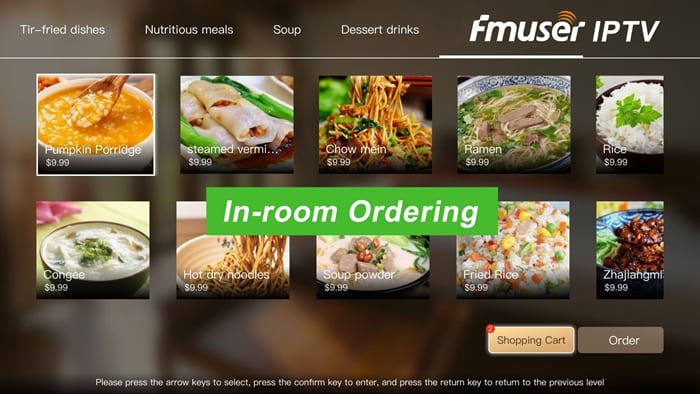
Here’s how African hoteliers are monetizing Hotel Video Distribution without annoying guests:
3 Ways to Turn TVs into Cash Flow
- In-Room VOD Rentals: Offer a library of the latest movies, kids’ shows, or local documentaries for $1–$5 per rental. A family settling in after a safari might pay $3 to stream a popular Nollywood film—easy income with zero extra effort. - Hypothetical ROI: If 20% of your 100-room hotel rents one movie daily at $2, that’s $1,200/month.
- Local Business Ads: Partner with nearby restaurants, tour operators, or shops to run 15–30 second ads during live TV breaks. For example: “Enjoy 10% off dinner at Lagos’ XYZ Bistro—5 minutes from this hotel!” - Charge businesses $50–$200/month per ad slot, depending on visibility.
- Upsell Promos: Auto-play loops promoting your hotel’s spa packages, breakfast buffets, or event spaces during check-in/out times. A subtle promo during morning news could boost spa bookings by 15–30% (industry estimates).
The Math That Convinces Hoteliers
Take a 100-room hotel in Nairobi:
- VOD Revenue: $1,200/month (as above).
- Ad Partnerships: 10 local businesses paying $100/month each = $1,000/month.
- Upsells: A 20% lift in spa bookings (from 10 to 12 guests/day at $50/service) = $3,000/month.
- Total Potential: Over $5,200/month—enough to cover IPTV costs in 6–8 months, then profit indefinitely.
Why Cable TV Can’t Compete
Traditional systems lack the agility for ads, VOD, or targeted promos. With IPTV, you control:
- Ad Timing: Run peak-hour ads for nearby nightclubs or off-peak promos for breakfast.
- Free Local Content: Air free UHF channels (e.g., Ghana’s TV3) to keep guests engaged between paid content.
- Guaranteed Uptime: Unlike cloud-dependent models, LAN-based ads/VOD work even during internet outages.
Unlocking Africa’s Hospitality Potential
For hotels in Accra, Dar es Salaam, or Cape Town, IPTV turns idle screens into revenue allies. Imagine a guest watching a forced ad for a Maasai Mara tour during halftime—then booking it via your TV menu. These micro-transactions add up, all while enhancing (not disrupting) the guest experience.
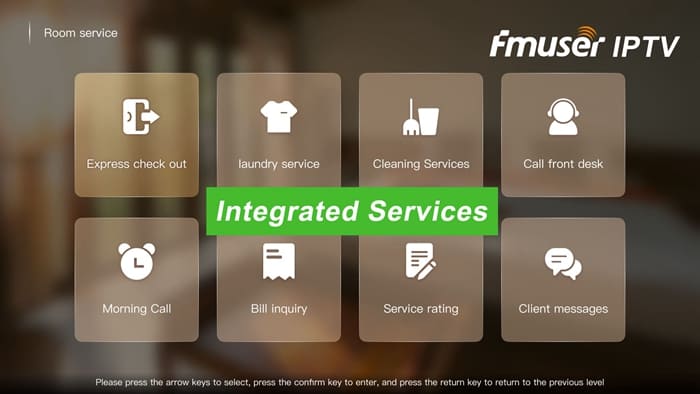
IPTV doesn’t just cut costs—it uncovers revenue hiding in plain sight. Why let your TVs gather dust when they could be gathering profits?
Contact Now, We're Here to Help!
9. No Engineer Required: Modern IPTV for Non-Tech Hotel Teams
Switching to IPTV might sound like a task for IT experts—until you realize today’s systems are designed for hoteliers, not hackers. Forget complicated setups or hiring pricey technicians. With user-friendly LAN-based IPTV, even teams with zero technical background can manage your entire Hotel Video Distribution system from a single dashboard.
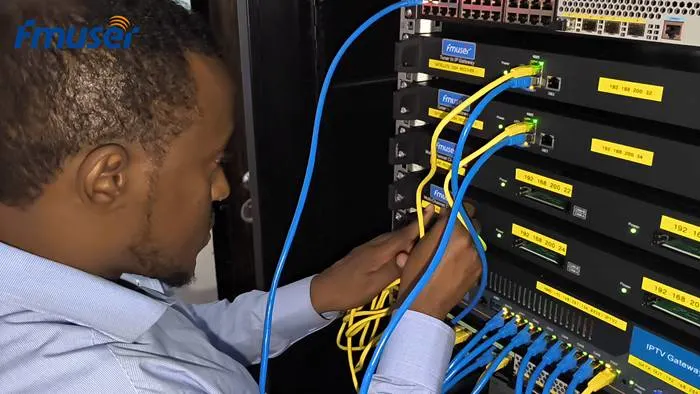
Simpler Than Streaming Netflix: The IPTV Advantage
One Dashboard, Total Control: Modern IPTV systems use intuitive Content Management Systems (CMS) similar to updating a Facebook page. Drag-and-drop menus let you:
- Schedule ads or promos in minutes.
- Update welcome screens for seasonal events (e.g., “December Holiday Specials”).
- Add/remove channels without touching a single cable.
- Plug and Play Compatibility: IPTV runs on your existing LAN infrastructure. No rewiring, no new cables—just connect encoders to DSTV boxes and let the network handle the rest.
- Remote Fixes, Zero Downtime: Encoder acting up? Software updates rolled out? Most issues can be fixed remotely by your provider, avoiding costly on-site visits.
Scenario: Your receptionist notices a typo in the spa promo airing on room TVs. With IPTV’s CMS, she logs in during her shift, uploads the corrected video, and hits “publish”—no engineers, no downtime.
 |
 |
 |
 |
 |
 |
FMUSER’s Turnkey Solution: Designed for African Pragmatism
Worried about setup? FMUSER’s LAN-based IPTV kits come pre-configured for hassle-free deployment:
- Pre-Loaded Templates: Branded TV menus, ad slots, and welcome screens ready to customize.
- Local Training & Support: On-site or virtual training ensures your team masters the CMS in a day.
- No Cloud Dependencies: Manage everything via your hotel’s local server—ideal for regions with spotty internet.
The Hidden ROI: Time Saved = Money Earned
A 100-room hotel using cable TV might spend 10+ hours monthly coordinating with providers for channel changes or ad inserts. IPTV cuts this to under 2 hours—freeing staff to focus on guests, not gridlocks.
Lack of tech skills isn’t a barrier—it’s an excuse to adopt smarter tools. IPTV puts you in charge, no engineering degree required.
Contact Now, We're Here to Help!
10. The Verdict: Why Surviving on Cable TV is a Race to the Bottom
For years, cable TV was the only option for hotels. But clinging to it today is like relying on landlines in the smartphone era. Let’s break down the choice facing Africa’s hoteliers:
Cable TV vs. IPTV: A Final Showdown
- Cost: Cable TV drains budgets with per-room subscriptions and hidden fees. IPTV slashes costs by up to 80% through shared decoders and zero recurring charges.
- Control: Cable locks you into rigid bundles. IPTV lets you blend DSTV with free UHF channels, promos, and ads—no third-party permission needed.
- Scalability: Expanding with cable means rewiring chaos. IPTV grows on your LAN like adding apps to a phone.
- Guest Engagement: Buffering and bland menus drive guests to their phones. IPTV wows with HD streams, casting, and personalized welcomes.

Hotels embracing IPTV aren’t just cutting costs—they’re boosting reviews, monetizing screens, and future-proofing operations. Meanwhile, those stuck with cable face rising expenses, tech obsolescence, and guests increasingly opting for competitors with modern amenities.
The Window for Competitive Advantage is Closing
Across Africa, forward-thinking hotels are already using IPTV to:
- Lower operational costs by $15,000+ annually (for a 100-room hotel).
- Earn $5,000+/month from ads and VOD.
- Secure 30% higher guest satisfaction scores via seamless streaming.
Every month spent on cable is a month lost to rivals who’ve upgraded.
Contact Now, We're Here to Help!
FAQs
Q1: How does a LAN-based IPTV system like FMUSER’s reduce costs compared to traditional cable TV?
A1: FMUSER’s LAN-based IPTV eliminates the need for costly “one-box-per-room” setups by centralizing content distribution via HDMI encoders and existing LAN infrastructure. For example, one DSTV/Canal+ decoder paired with an encoder can stream to hundreds of rooms, reducing monthly subscription fees by up to 80%. Unlike cable TV, there are no recurring per-room charges or third-party licensing fees. FMUSER also offers flexible hardware bundles tailored to African hotel budgets, ensuring a one-time investment with long-term ROI and no hidden costs.
Q2: Can FMUSER’s IPTV system scale as my hotel expands?
A2: Absolutely. FMUSER’s solution is designed for seamless scalability. Adding rooms or TV channels is as simple as plugging in additional HDMI encoders to your existing LAN network, with no rewiring required. For hotels planning phased expansions, FMUSER provides modular hardware packages that grow with your property, whether upgrading from 50 to 500 rooms or integrating new satellite feeds like UHF channels.
Q3: Will the system work during internet outages?
A3: Yes. Since FMUSER’s IPTV is LAN-based, it operates independently of external internet connections. Critical features like live TV, pre-loaded VOD libraries, and in-house ads function flawlessly offline, making it ideal for African hotels in areas with unreliable internet. Local servers store all content, ensuring guests never face disruptions.
Q4: Do I need technical expertise to manage FMUSER’s IPTV system?
A4: No. FMUSER’s user-friendly CMS (Content Management System) allows non-technical teams to manage TV channels, promo schedules, and welcome messages via an intuitive dashboard. The plug-and-play setup includes pre-configured templates, and FMUSER offers free on-site or virtual training. For troubleshooting, remote support is available through their African service centers.
Q5: How easily does FMUSER’s IPTV integrate with existing cable TV infrastructure?
A5: FMUSER’s systems coexist with legacy cable setups. Existing DSTV/Canal+ decoders can be connected to HDMI encoders and redistributed to all rooms over LAN, eliminating redundant subscriptions. This hybrid approach lets hotels transition gradually without upfront overhauls. FMUSER also provides RF modulators to integrate older coaxial TV systems if needed.
Q6: Can I customize content like ads or welcome messages for guests?
A6: Yes. FMUSER’s CMS supports full customization, including forced ad inserts during live TV, branded welcome screens, and region-specific VOD libraries. For example, a Kampala hotel can run ads for local safari tours while a Lagos property promotes its rooftop bar. Updates take minutes via drag-and-drop tools—no coding or outsourced tech support required.
Q7: What happens if hardware malfunctions?
A7: FMUSER provides robust warranties and 24/7 technical support through regional partners in Africa. Critical hardware like encoders and servers are commercial-grade, built for 24/7 operation. On-site replacements are available, and redundant systems (e.g., backup servers) can be configured for high-traffic hotels.
Q8: Are FMUSER’s systems compatible with older TVs in my hotel?
A8: Yes. FMUSER offers IPTV set-top boxes to modernize older TVs or RF modulators to convert IPTV signals for coaxial inputs. This ensures compatibility with any TV model, avoiding costly replacements. For new TVs, mobile casting support allows direct streaming via Wi-Fi.
Contact Now, We're Here to Help!
Conclusion: The Smart Choice for Modern Hotel Video Distribution
Traditional cable TV systems burden hotels with soaring costs, rigid content, and outdated technology—problems that LAN-based IPTV solves with unmatched efficiency. From slashing subscription fees by 80% to enabling profitable in-room ads and seamless scalability, FMUSER’s IPTV solution transforms how African hotels manage video distribution. Unlike cloud-dependent alternatives, FMUSER’s systems prioritize ownership, offline reliability, and full customization, ensuring long-term control without hidden fees.
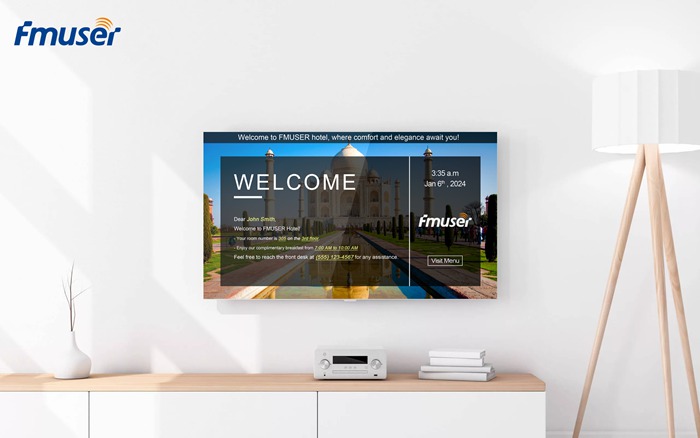
For hoteliers seeking to future-proof their properties, boost guest satisfaction, and unlock new revenue streams, the transition to IPTV isn’t just an upgrade—it’s a strategic necessity. Hotels clinging to cable TV risk falling behind competitors already harnessing smarter, cost-effective streaming solutions.
Ready to Lead the Shift?
Discover how FMUSER’s LAN-based IPTV can modernize your hotel’s video distribution with:
- Zero Recurring Fees: Own your system outright.
- Africa-Tested Reliability: Offline functionality for uninterrupted service.
- Turnkey Support: Setup, training, and local technical assistance.
Contact FMUSER for a Free Consultation today and take the first step toward a smarter, more profitable hospitality future. Don’t let outdated cable hold your hotel back—upgrade, own, thrive.
Contact Now, We're Here to Help!
Tags
Contents
Related Articles
CONTACT US


FMUSER INTERNATIONAL GROUP LIMITED.
We are always providing our customers with reliable products and considerate services.
If you would like to keep touch with us directly, please go to contact us





